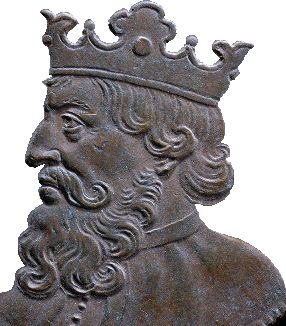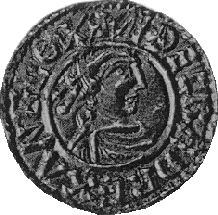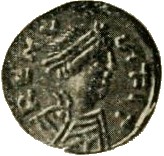Related Research Articles

Year 629 (DCXXIX) was a common year starting on Sunday of the Julian calendar. The denomination 629 for this year has been used since the early medieval period, when the Anno Domini calendar era became the prevalent method in Europe for naming years.

Year 567 (DLXVII) was a common year starting on Saturday of the Julian calendar. The denomination 567 for this year has been used since the early medieval period, when the Anno Domini calendar era became the prevalent method in Europe for naming years.

Chlothar II, sometime called "the Young", was king of the Franks, ruling Neustria (584–629), Burgundy (613–629) and Austrasia (613–623).

Chilperic I was the king of Neustria from 561 to his death. He was one of the sons of the Frankish king Clotaire I and Queen Aregund.

Æthelred or Ethelred is an Old English personal name and may refer to:

Sigebert I was a Frankish king of Austrasia from the death of his father in 561 to his own death. He was the third surviving son out of four of Clotaire I and Ingund. His reign found him mostly occupied with a successful civil war against his half-brother, Chilperic.

Charibert I was the Merovingian King of Paris, the second-eldest son of Chlothar I and his first wife Ingund. His elder brother Gunthar died sometime before their father's death. He shared in the partition of the Frankish kingdom that followed his father's death in 561, receiving the old kingdom of Childebert I, with its capital at Paris.

Charibert II, a son of Clotaire II and his junior wife Sichilde, was briefly King of Aquitaine from 629 to his death, with his capital at Toulouse. There are no direct statements about when Charibert was born exactly, the only known fact being that he was "a few years younger" than his half-brother Dagobert. His father Clotaire evidently had a bigamous marriage and he was the offspring of the junior wife.
Ingonde, Ingund, Ingunda, or Ingundis was a queen of the Franks by marriage to Clotaire I, son of Clovis.
Sláine is an Irish given name.
Charibert, Count of Laon, was the maternal grandfather of Charlemagne. Charibert was the father of Charlemagne's mother, Bertrada of Laon.
Æthelweard, also spelled Ethelweard, Aethelweard, Athelweard, etc., is an Anglo-Saxon male name. It may refer to:
Æthelric is a masculine Anglo-Saxon name that may refer to:
Muiredach, Muireadhach or Muireach, anglicized variously to Murdoch, Murtagh, Murray, Murdac, Mordacq and other forms, is a Goidelic name popular in Scotland and Ireland in the Middle Ages:
Elfriede, also known as Elfreda, Elfrida, Alfrida, Aelfrida, Elfrieda, Elftrude, Elftraut among other variants, is a female given name, derived from Ælfþryð (Aelfthryth) meaning "elf-strength". The name fell out of fashion in the Middle Ages and was revived in the 19th century in both England and Germany. Although some of its modern forms like Alfieda can be mistaken for feminine versions of Alfred, that derives from Ælfræd. The Southern German diminutive Friedel or Friedl is nowadays more common than the full name.
Murchadh is masculine given name of Irish origin, used in the Irish and Scottish Gaelic languages.
Charibert de Haspengau (555–636) was a Frankish nobleman, possibly a comes. The identity of his parents is uncertain, though he is believed by some to be the son of King Charibert I of Paris. Charibert is described as Charibert nobilis in Neustria. No other information is available other than descriptions of his grandchildren, who are described as having "high rank and worthy of significant positions" within the palace.
Marcovefa was a Frankish queen consort by marriage to King Charibert I.

Gomentrude, also Gomatrude, Gométrude, or Gomatrudis, was a Frankish queen consort by marriage to king Dagobert I. It is possible that Gomentrude was descended from Ragnacaire, king of the Franks in Cambrai, through his son Magnachaire, Duke of the Franks. She was the younger sister of queen Sichilde, third wife of King Clotaire II. Their brother was likely lord Brodulf, who tried to defend the rights of his nephew on the kingdom of Aquitaine against the ambitions of Dagobert I.
Berthar is a masculine Germanic given name meaning "glorious warrior". The name Charibert has the same meaning, combining the same two roots in reverse order. In its variant spellings, it may refer to:
References
- ↑ Laury Sarti, Perceiving War and the Military in Early Christian Gaul (ca. 400–700 A.D.) (Brill, 2013), p. 260.